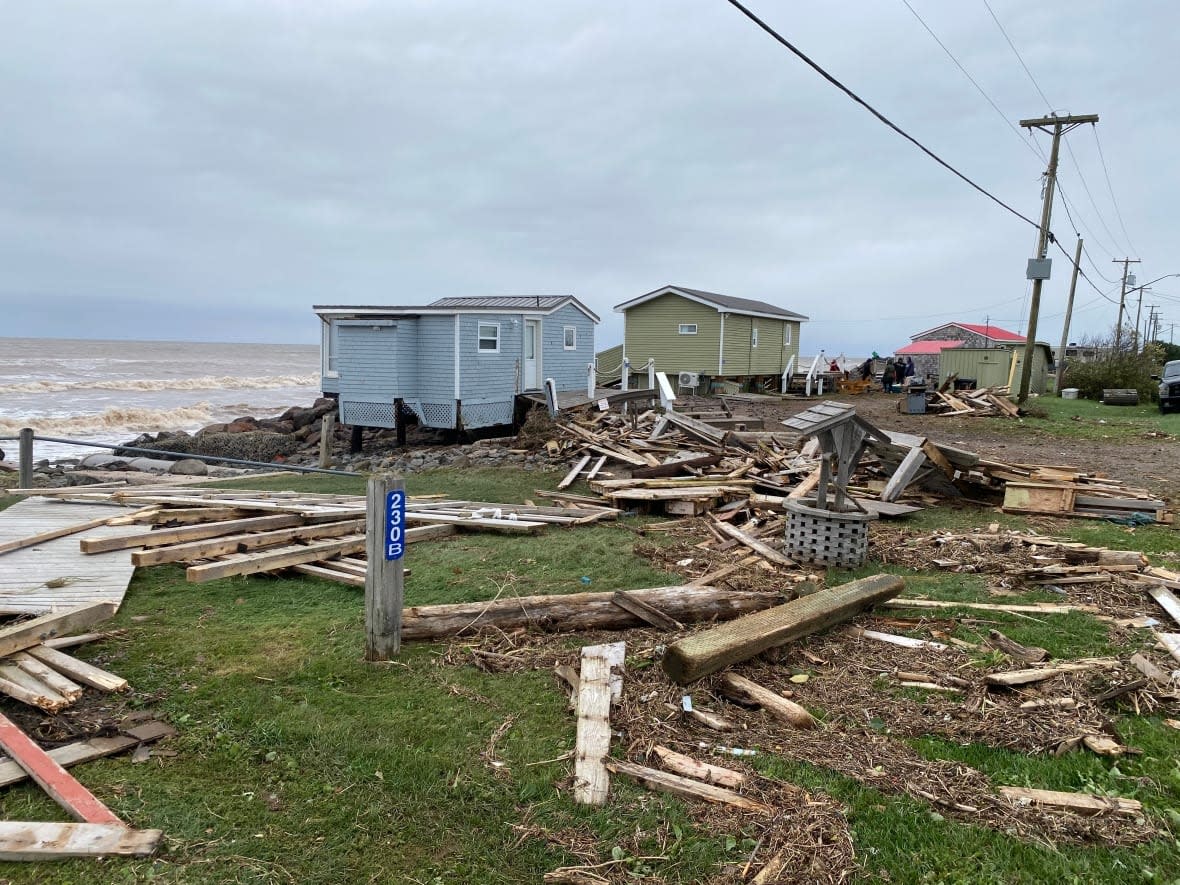Something needs to be done, but what? N.B. and feds talk flood insurance

Federal and provincial politicians in New Brunswick agree something needs to be done to address a lack of insurance coverage for residences and businesses in flood zones, but they seem to differ on whether secondary homes and future builds deserve their intervention.
Premier Blaine Higgs and federal Infrastructure Minister Dominic LeBlanc were commenting in the wake of damage to properties along the east coast during post-tropical storm Fiona. According to Higgs, damage to about 100 properties has been reported in New Brunswick.
A conversation should happen with the insurance industry, Higgs said, to come up with some kind of affordable coverage solution for people who have lived in a place for a long time that now has higher risk factors because of climate change.
"There needs to be some recognition of conditions that have changed," he said.
"I do want to see people protected on areas that maybe 20 years ago would not have been a problem. Through no fault of their own, they're now exposed."

But going forward, Higgs said, building shouldn't be allowed in areas including wetlands, flood zones and known storm exposure areas "unless the owner's prepared to take that risk."
Federal Infrastructure Minister Dominic LeBlanc agreed with Higgs that governments should work with insurance companies, affected families and small businesses "to figure out a way that people aren't at risk personally for some of these losses that will increasingly become uninsurable."
It's a problem across the country, said LeBlanc, and the federal ministers of finance and emergency preparedness will discuss the matter further with the provinces.
LeBlanc, who represents the New Brunswick riding of Beauséjour, also agreed with Higgs that longer-term residents — people who built on the water 25 years ago — deserved more consideration, but he did not make a distinction between homes or cottages.
It's often "a family's most important asset," he said.
There's already a disaster financial assistance program under which the provinces can submit a claim to the federal government that will cover a significant portion of the cost of damages, including to private property.
But LeBlanc says a better option is needed "that's more reliable … for people to have this security and not wait for a disaster to happen."

People in Atlantic Canada have invested a lot of money in coastal properties, he said, and will want to continue to do so.
LeBlanc himself has a property on the coast, in Grande-Digue, that he and his wife "adore" and that used to belong to his father.
"I don't think we tell people they can't have properties along the coastline, but I think as people build new properties or new homes or new cottages, we all need to think about the way to make them resilient."
To some degree, the insurance market will take care of that, he said.
"You're not going to be able to get a mortgage to build a big house along the water if you can't insure it, and you're not going to be able to insure it if there's not some focus on the way to make it resilient and protected in the face of these extreme weather events.
"The government just has to, I think, find the right role to play, so that it doesn't become prohibitive for people."
The director of climate change adaptation for the Conservation Council of New Brunswick agreed society could probably never eliminate the "human need to be near water."
But people have to be willing to work with nature, said Louise Comeau, not against it.
People can still have a view, she said, but that means protecting wetlands, trees, shrubs, other plants and root systems near shorelines, as well as relocating homes.
The government can't afford to foot the bill for everyone facing these issues, said Comeau.
But in a sense, it is liable, she said, because the effects of climate change have been known "for decades," and appropriate rules and regulations are still not in place.
There's still too much development happening in known risk areas, said Comeau.

"People often lobby very hard for exemptions" she said, and authorities will often concede.
She made an example of something happening now in the Maugerville area.
The province is trying to implement a land-use plan that would limit development in the flood plain, she said, but the community is objecting on the grounds that it would hurt their property values and restrict their freedom of choice.
"The reality is there are social consequences," said Comeau, "and we need to work together to keep each other safe."
She called on the province to act quickly to create a "statement of interest" on climate change, which would guide communities and regions when they consider development proposals and building permits.
A statement from province Wednesday said it has been "consulting on a number of potential topics including climate change and flood hazard areas. Government will consider these this fall and if they are to move forward, they will be released for public input. They could come in the new year, as early as January 1."


